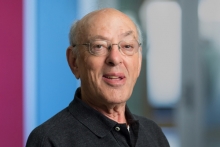Prof. Henry Mintzberg has been observing, advising and researching organizations since the early 1970s, and has had a profound influence on their study. The most recent book from the John Cleghorn Professor of Management Studies is Understanding Organizations…Finally! Structure in Sevens, and it synthesizes decades of analysis to understand the forces that shape organizations. “I have probably changed more than organizations have,” Mintzberg told Le Devoir.
As chief of the Service de police de l’Agglomération de Longueuil (SPAL), Fady Dagher (EMBA’12) carried out a real revolution in the force, and he has now taken the reins of the Service de Police de la Ville de Montréal (SPVM) as its new chief, writes McGill Alumni News. In Longueil, Dagher took the concept of “community policing” one step further by creating a “partnership police force” that works hand-in-hand with social services. Dagher credits McGill Desautels Prof.

The Best Scientist for 2023 rankings are in, and Desautels Prof. Henry Mintzberg was ranked among the top academics in the world. Research.com ranked Mintzberg as the top Business and Management academic in Canada – and #47 worldwide. The rankings are based on the D-index metric, which measures the cumulative impact of a scholar’s work through its influence within a discipline’s peer-reviewed journals. Research.com also recognized Mintzberg with its Business and Management Leader in Canada Award for 2023.

According to Professor Henry Mintzberg, there are four types of organizations: autocracy, meritocracy, bureaucracy, and adhocracy. Each type has its own strengths and weaknesses. Many small businesses are autocracies and revolve around the vision of their founder. This gives them a limited management hierarchy and can help enable dynamism. But there are drawbacks too: a founder obsessed with their own vision may lose sight of some of the practical details needed to make their business profitable.

MBAs have their advocates – and their detractors. Over the years, the MBA has suffered from comparisons with professional degrees that have more defined outcomes, like medicine and law. But management is part art and part science, and an overemphasis on the science side is partly to blame for this perception. As evidence of this, MBA News cites the work of Desautels Prof. Henry Mintzberg, who argued that successful business leaders need to exercise both analysis and intuition.

How has management thinking changed in the past 50 years and where might management be headed today? In his research and writing, Desautels Faculty of Management Professor Henry Mintzberg covers not only the past 50 years but looks toward the future of managing organizations, developing managers, and rebalancing society, from business to politics to higher education.

The pandemic demanded a rapid response from health care systems around the world. This revealed both strengths and weaknesses–and now there is an opportunity to examine the experience for lessons about the future. The International Masters for Health Leadership is doing exactly that. Groups of students studied a health care system and the unique challenges that it faces, which ranged from a dearth of e-health records to a culture of vaccine hesitancy.

Analytics can tell a story–but they don’t tell the whole story. In any organization, managers need to have an awareness of personalities and politics, and that can affect the decisions they make, writes David Creelman in Talent Management and HR. Creelman’s conclusions are partly based on a study of accountants carried out by Desautels Prof. Henry Mintzberg several decades ago. Mintzberg found that managers didn’t use accounting information the way that the accountants thought they should.

E-commerce. Telecommuting. Digital transformation. In just a few years, the workplace has changed dramatically. And management is not linked strongly enough to these new realities, according to Prof. Henry Mintzberg. In this new world of work, creative solutions can foster future success. Flattening hierarchies and seeking client feedback can help organizations unlock their employees’ potential.

In an ideal economy, hard work and creativity would be rewarded – and each person could lead a life of meaning and dignity. But our obsession with metrics can get in the way, according to Prof. Henry Mintzberg, the John Cleghorn Professor of Management Studies at the Desautels Faculty of Management.

Women still face barriers in attaining leadership roles, and rethinking leadership is one part of solving this problem, writes Marine Thomas. For that, the Editor-in-Chief of Les Affaires looks to the ideas of Desautels Prof. Henry Mintzberg. By dispersing leadership throughout an organization, companies can create a flexible and inclusive workplace that is more conducive to the advancement of women’s careers.

Obsessing over leadership can lead to a world full of followers. Prof. Henry Mintzberg has identified 52 qualities of effective managers, and no one person has all of them. No matter how competent a manager is, they will always have strengths and weaknesses.

The Holme Grange School (U.K.) recently became the first school in the world to earn the eduCCate Global Gold Award in recognition of its efforts to equip students with tools to fight climate change. Inspired by Desautels Professor Henry Mintzberg’s book, Rebalancing Society, the school developed a 15-week sustainability program for Year 9 students called “Radical Renewal.” To commemorate the launch, Professor Mintzberg spoke with students on the importance of collective action.

Earlier this month, Policy Magazine hosted a Q&A-style webinar with Professor Henry Mintzberg, author of Managers Not MBAs. Moderated by Professor Karl Moore, the discussion focuses on common barriers to managing well in a pandemic environment.

Inspired by McGill’s International Masters for Health Leadership (IMHL) program, Laval University’s Faculty of Medicine recently designed an internship for rising medical graduates to tackle challenges in pandemic management and rural medicine. Thanks to the model of collaboration developed by Professor Henry Mintzberg, IMHL Faculty Director, these students are equipped to serve on the frontlines of COVID-19 research and practice.
